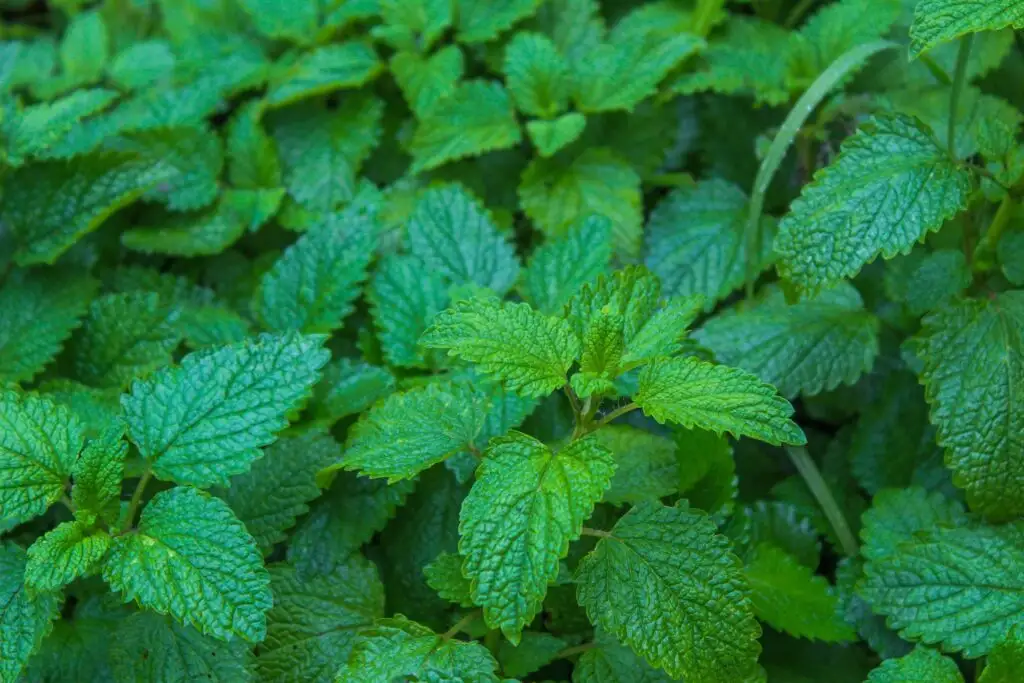Melissa officinalis
Latin Name: Melissa officinalis
Herb Class/Action: Healthy Inflammatory Response Support, Nervine, antiviral, antibacterial, carminative, diaphoretic, immune stimulating
Parts Used: Leaves, flowers
Flavors: Sour, pungent, slightly sweet and bitter, citrusy
Energetics: Drying, mildly warming, tonifying
Traditional Benefits: Nervous system support, mood support, sleep support, brain support, thyroid and heart support, respiratory support, digestive support, skin support, immune support
Deemed as “one of natures best nervine herbs,” Lemon Balm works to help calm and rejuvenate the nervous system.
Lemon Balm is a multifaceted herb in the mint family that has been used medicinally for hundreds of years for everything from seasonal depression to colds and flus.You’ll want to have this herb stocked in your home apothecary — especially during the winter months to keep spirits up and immunity on track.
Lemon Balm is native to the Mediterranean and Middle East, but you can find this herb growing virtually all over the world. The name Lemon Balm comes from the hard to miss sweet and citrusy scent of this herb. Lemon Balm is in the mint (Lamiaceae) family. Like most herbs in the mint family, it spreads easily and grows quite abundantly. So abundantly that you’ll want to plant Lemon Balm in containers to avoid having it take over your whole garden. Another common name for this herb is Melissa, which happens to be the Latin word for ‘bee’ in greek. Lemon Balm produces tons of beautiful purple flowers and is a pollinator favorite for honey production. While the flowers are beautiful, it’s best to harvest the young leaves for medicinal use before the plant goes to flower.

Now, let’s dive into the medicinal properties of this special herb. Lemon Balm has a long list of medicinal uses but is best known as an immune, digestive, and mood remedy. Lemon Balm has often been referenced as the “gladdening herb” for the uplifting qualities that it brings to the spirit and overall mood. Lemon Balm is classified as a nervine herb meaning it works on the nervous system to calm and soothe anxiety and stress – an excellent ally for depression and seasonal affective disorder (SAD).
Being that this herb acts so gently and is kid-safe, it is also a go-to herbal remedy for fussy and restless children.
Another notable medicinal quality of Lemon Balm is its antiviral and antiseptic actions. This is due to the volatile oils that are present within this herb that help block viral replication in the body. Lemon Balm’s antiviral and nervine actions work together to remedy the feelings of anxiousness and restlessness that often accompany illness. Lemon Balm has also demonstrated in studies to work very effectively as a topical agent against the herpes virus.
You’ll often find Lemon Balm as a popular addition to many tea formulas to help cut the sharp and bitter flavor of other herbs. Enjoy this herb in a hot tea or in tincture form. If using Lemon Balm topically you can make a poultice or a strong infused oil.
Another common name for this herb is Melissa, which happens to be the latin word for bee in greek. Lemon Balm has tons of beautiful purple flowers and is known as a pollinator favorite in producing honey.

